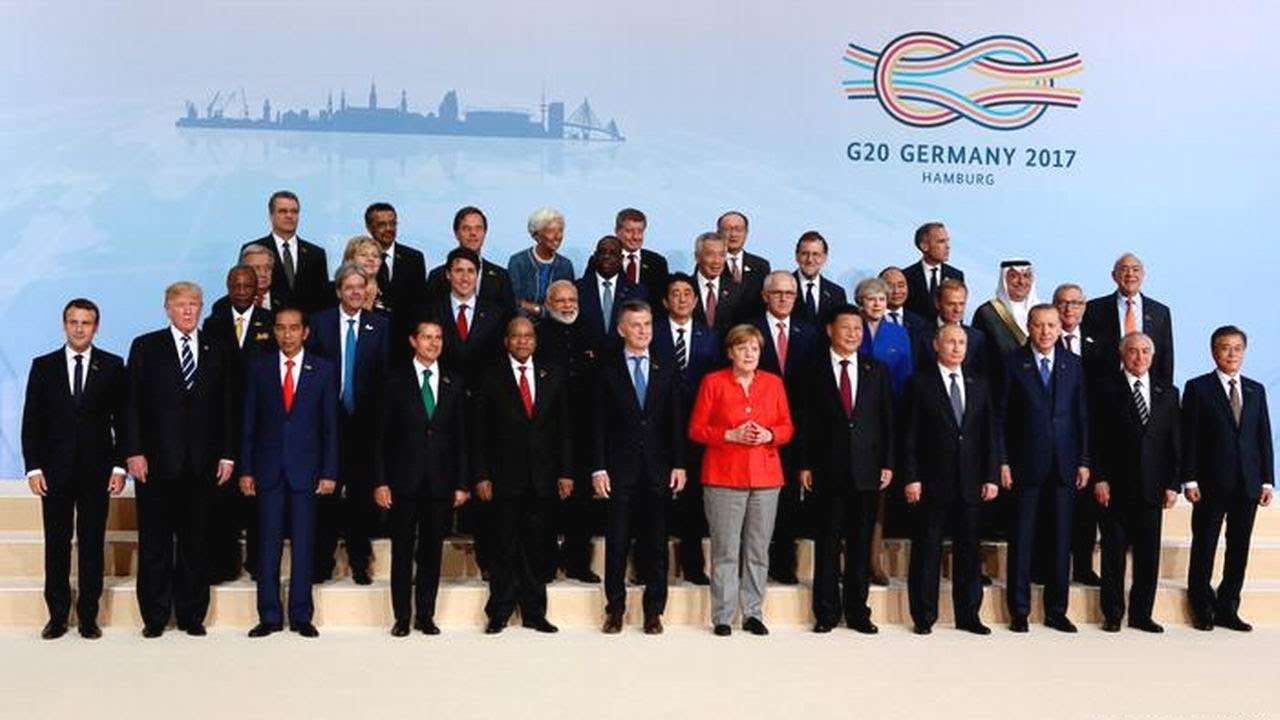
The leaders of the biggest world economies, as well as those of emerging countries, reunited last week, on 7 and 8 of July, for the 12th reunion of the G20 states. This was one of the most awaited events globally. If last year the summit took place in China, this year the state leaders gathered in Germany, in order to discuss the most pressing issues regarding international relations, German chancellor Angela Merkel being the de facto host of the event. The reunion ended on the same pessimist tone provoked by the attitude of the US president Donald Trump in what concerns the refusal to cooperate in fighting against climate change, as well as his uncooperative vision about world economics, aspects which already caused already irritation among Western world leaders at a recent reunion of the G7 states. At the end of two full days of tensioned talks and controversial issues, several aspects need to be remembered and analyzed starting from these events.
What is G20?
G20 (Group of Twenty) was created in 1999. It reunites the big world economies and the big emerging economies. It is a forum in which take part states such as: Great Britain, Germany, France, Italy, USA, Canada, Japan, and Russia, representing the developed zone of the world economy, and on the other hand, Argentina, Brazil, Mexico, China, India, Australia, Indonesia, Saudi Arabia, South Africa, South Korea and Turkey, representing the emerging zone of the world economy. This summit is formed by the ministers of finance and governors of central banks from 20 economies – 19 of national economy, to which can be added those of the UE.
What were the states’ expectations from the G20 summit?
Besides the usual topics at the G20 summit, chancellor Angela Merkel chose to also focus on issues regarding the refugee crisis, terrorism, national security and public policies, which would tackle gender equality and renewable energy.
Taking into consideration the fact that one month ago the US got out of the Paris Agreement, in the international press was written about “the isolation” of Trump during the talks on this issue during the summit. This section, which slowed down the writing of an official final declaration about the reunion, caused by the insistence of the US to have a contribution when it comes to fossil fuel, was considered by all the other G20 members, except Trump, irreversible, writes The Guardian.
Thus, the person who showed total disappointment of Trump’s attitude when it comes to this issue was the British prime-minister, Theresa May. She stated that she has asked the American president to change his mind about leaving the agreement, giving her reassurance that Great Britain’s commitment is “as strong as sever.”
In order to mark the importance given to this issue, the French president Emmanuel Macron announced that on December 12 will host a summit which will try to make progress in what regards Paris Agreement, informs The Guardian.
At the same time, at the trade level, the US president brought up other questions among his partners, due to his protectionist behavior, visible in his slogan “America first” and his warnings of putting up border taxes for China and Europe for the import of cars and steel.
Nonetheless, the US agreed for first time, in the final statement, with the recognition from the victim states of the dumping practice to start using “legitimate tools for trade defence” and with the support of the role of “observant” of the World Trade Organization, often criticized by the US administration in the past, writes Reuters.
Still, during the summit, Donald Trump left the impression of a stubborn leader, who gives up territory very hardly, even when there is a large consensus regarding a certain issue, the reunion from Hamburg having the role of clarifying once more the small commitment of the US administration in issues supported by Europe.
Trump vs Putin or Trump & Putin?
Surely one of the most awaited moments of the summit was the official meeting between the president of the US and the one Russia, Vladimir Putin.
During these meetings, Donald Trump stated in his typical manner of Tweeting: “Putin and I talked about the creation of a cybernetic security base, in such a way that we could defend from cybernetic attacks on elections and many bad other things,” meaning that one of subjects of their talks was the elections and cybernetic attacks.
The talks between the two lasted longer than the time they were given – 30-40 minutes. Otherwise, the US secretary of state, Rex Tillerson, talked about “the positive alchemy” between the two state leaders, stating the bond formed between them really fast. Another aspect remarked by the journalists present at the meetings is that the US delegation send Melania Trump to see if she can put an end to the meeting, but not even this worked in this sense, according to Reuters.
During two hours and a half, both Vladimir Putin and Donald Trump tried to tackle various issues, showing excitement for their first official meeting.
Syria – the eternal hot issue
The leader from Kremlin stated for Sputnik News that he also talked with the US president about the issues of Ukraine and Syria: “We had a very long conversation with the US president, there were many issues tackled, such as Ukraine, Syria, other issues, some bilateral aspects.” Putin stated this at the beginning of a reunion with the Japanize prime-minister Shinzo Abe, which he had after the meeting with Trump, writes Reuters.
Thus, the two leaders got to the agreement that when it comes to the truce in the South-West of Syria, which entered into force on Sunday, for the stopping of aggressions between the rival factions. This represents the first step towards the building of relationships between the two big powers, cooperation being the right word which would describe the first interaction between Trump and Putin.
Anti-G20
Due to the protests, Melania Trump couldn’t participate in the events scheduled for Friday, being forced to stay in the hotel room, because the protesters surrounded the building. Also, they attached the guard of the hotel where the Russian president Vladimir Putin and other leaders were accommodated, in order to show their indignation, as The Guardian states.
After the violence, 70 people were retained and 160 policemen were injured. In order to disturb the reunion of the state leaders, they blocked several crossroads and “transfer passages”, thousands of anti-G20 protesters and policemen clashed, which resulted in 200 injured policemen and 265 arrested people. The protests against the summit escalated quickly, the firemen extinguished more than 70 fires and the rescue teams were called for 126 time during the last days. Also, in many cases, the firefighters’ teams couldn’t intervene before the policemen secured the area, taking into consideration the fact that the protesters set fire to cars, shops and vandalized them. The public authorities intervened with force and water cannons, states Reuters.
The protesters proved creativity during the week of the summit, after setting a choreography which became viral around the world and caught the attention in a different manner than the violence reported on by the media. Thus, some dozens of protesters put on “zombie” costumes and made the “contempt rally” on the streets of Hamburg, raising awareness on the importance of the citizen participation in politics.
The conclusions of the G20 summit
Surely the true consequences of this reunion won’t be noticeable for a while, after some process well established, realized in more stages, in order to reach each objective talked about and analyzed during the summit in Hamburg. Nonetheless we could be witnesses to the first official meeting between the leaders of two big economic powers, and not only. We can be sure that this was only the beginning of a chain of events with big worldwide impact. At the end of the 2 days of summit, what’s left to remember is the irritation of the European leaders towards the way Donald Trump tackles global issues, a perspective which the leader from Kremlin will try to profit on as much as he can, but also the anticipation of the fact the European-US will reset strategically, at least for the period of the current administration from the White House, after the European leaders seem to have lost their patience with the new US president.

